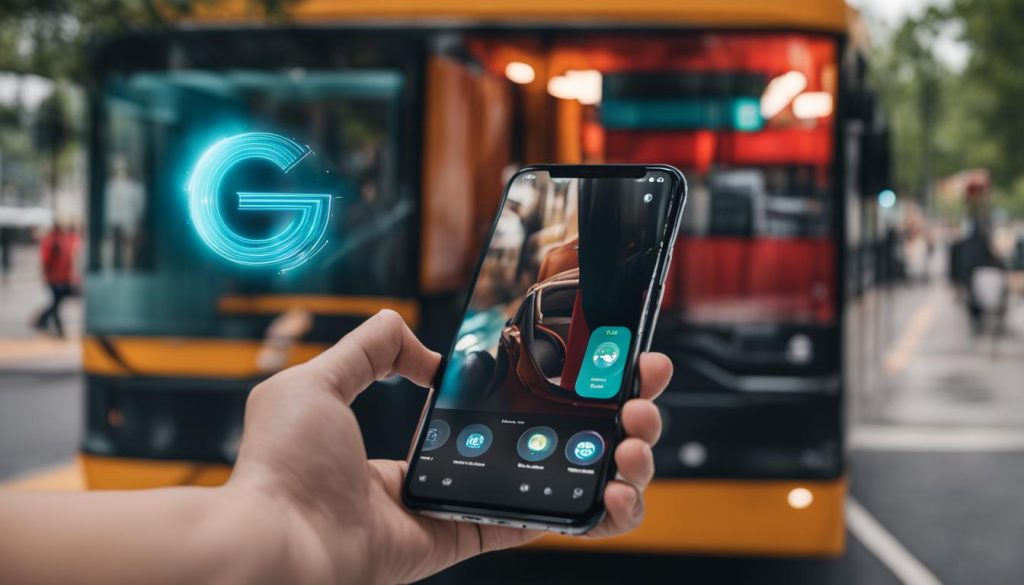Welcome to the era of 5G, the wireless technology that promises to revolutionize high-speed internet connectivity. With 5G, you can expect faster speeds, reduced lag, and seamless connectivity on your mobile network. This new generation of telecommunications will significantly enhance data transfer and optimize network infrastructure.
So, what does 5G mean for you? It opens up a world of possibilities. Imagine enjoying high-speed internet on your smartphone, streaming your favorite movies and shows without buffering, and downloading large files in seconds.
But the impact of 5G goes beyond just faster internet. It paves the way for exciting advancements in various industries. From autonomous mobility solutions like self-driving cars to hyper-connected smart factories powered by the Internet of Things, 5G is transforming how we live and work.
Virtual reality and augmented reality will also become more accessible to businesses, allowing for immersive experiences and increased productivity. The complexity of edge computing will be handled seamlessly, enabling real-time data processing and analysis.
Get ready to embrace the power of 5G and elevate your digital life. Stay tuned to learn more about how 5G will revolutionize business operations, transform industries, and shape the future of connectivity.
How 5G Will Revolutionize Business
5G is poised to revolutionize business operations across various industries, offering a new wave of innovation and improved customer experiences. One of the key areas where 5G will make a significant impact is autonomous mobility. With the low latency of 5G, self-driving cars can communicate and make decisions faster, leading to safer and more efficient transportation. As 5G becomes more widespread, we can expect to see autonomous mobility solutions becoming more commonplace, transforming the way we travel.
Smart factories are another area that will benefit from the adoption of 5G. With the hyper-connectivity enabled by 5G, factories can create a seamless network of interconnected devices, allowing for real-time data collection, analysis, and optimization. This level of connectivity and automation will revolutionize manufacturing processes, leading to increased efficiency and productivity.
Furthermore, 5G will play a pivotal role in enhancing virtual reality (VR) and augmented reality (AR) experiences for businesses. The high bandwidth and low latency of 5G will enable more immersive and responsive VR/AR applications, opening up new possibilities for industries such as gaming, education, architecture, and retail. These technologies will become more accessible and beneficial to businesses, leading to enhanced customer experiences and improved engagement.
Edge computing is another area where 5G will unleash its potential. With the support for edge computing, high-performance applications can be processed and stored closer to where data is generated, resulting in ultra-low latency and real-time responsiveness. This will revolutionize industries such as healthcare, finance, and logistics, enabling faster and more efficient data analysis, decision-making, and automation.
How 5G Will Revolutionize Business
- Autonomous mobility: Faster communication and decision-making for self-driving cars.
- Smart factories: Real-time data collection and analysis for increased efficiency and productivity.
- Virtual reality and augmented reality: More immersive experiences with high bandwidth and low latency.
- Edge computing: Ultra-low latency and real-time responsiveness for faster data analysis and automation.
In conclusion, 5G is set to revolutionize the way businesses operate across various industries. From autonomous mobility to smart factories, virtual reality to edge computing, the adoption of 5G will unlock new levels of innovation and customer experiences. As businesses embrace the potential of 5G, they will stay ahead of the curve, gain a competitive advantage, and pave the way for a future of enhanced connectivity and technological advancements.
The Impacts of 5G on Industries
5G technology is set to have a profound impact on various industries, revolutionizing the way businesses operate and transforming the customer experience. Let’s take a closer look at some of the key industries that will be significantly affected by the advent of 5G.
Media and Entertainment
- The media and entertainment industry will benefit from the enhanced capabilities of 5G, enabling the delivery of immersive experiences through technologies like virtual and augmented reality.
- Streaming high-quality content will become seamless and buffering-free, offering users a more enjoyable and immersive viewing experience.
- 5G will also pave the way for the widespread adoption of holograms, allowing for interactive and engaging entertainment experiences.
Manufacturing
- Manufacturing processes will be revolutionized by 5G, with increased connectivity and real-time data analysis leading to higher efficiency and productivity.
- Smart factories will be able to leverage 5G’s low latency and high bandwidth to optimize production processes, reduce downtime, and enhance automation.
- With the help of technologies like artificial intelligence and machine learning, manufacturing will become more streamlined and data-driven, resulting in improved quality control and cost savings.
Healthcare
- 5G will bring significant advancements to the healthcare industry, enabling remote patient monitoring, telemedicine, and precise positioning for critical applications like surgeries.
- Doctors will be able to provide real-time consultations and perform surgeries remotely, increasing access to healthcare services for patients in remote areas.
- The ability to transmit large medical data sets quickly and securely will facilitate more accurate diagnosis and treatment, ultimately improving patient outcomes.
Retail
- 5G will transform the retail industry by enhancing the customer experience both online and in physical stores.
- With 5G’s high-speed internet, retailers can provide immersive virtual shopping experiences, personalized recommendations, and seamless checkout processes.
- Real-time inventory tracking and automated supply chain management enabled by 5G will result in more efficient operations and reduced costs for retailers.
These are just a few examples of how 5G will impact industries like finance, shipping and transportation, and more. As the technology continues to evolve and become more widely available, businesses across various sectors will need to adapt and embrace the potential of 5G to stay competitive in the digital age.
The Advantages of 5G for Users

When it comes to the user experience, 5G brings a multitude of advantages that will greatly enhance your internet connectivity and offer new value-added capabilities. With 5G coverage, you can expect improved internet speeds, low latency, and high download speeds, providing a seamless and responsive experience.
The capabilities of 5G extend beyond just faster internet. The technology enables the Internet of Things (IoT) to flourish, connecting devices and enabling smart homes, smart cities, and smart buildings. With 5G, you can embrace the potential of virtual reality and augmented reality, immersing yourself in interactive experiences like never before.
- Experience low latency: The low latency of 5G ensures reduced delays, allowing for real-time interactions and instant responsiveness. Whether you’re streaming content, participating in online gaming, or using augmented reality applications, you can enjoy a consistent and lag-free experience.
- Enjoy high download speeds: With 5G, downloading large files, streaming high-definition videos, or accessing data-intensive applications is faster than ever. Say goodbye to long wait times and hello to instant access to content and information.
- Benefit from consistent coverage: 5G networks offer extensive coverage, ensuring that you stay connected even in areas with high user density. Whether you’re in a bustling city or a remote location, you can rely on the consistency of 5G connectivity.
5G is a significant upgrade from previous generations of mobile networks, offering users a world of possibilities and transforming the way we connect, communicate, and consume content. Its value goes beyond just faster internet, providing a foundation for innovative technologies and enriching your digital life.
The Evolution of Mobile Networks
Mobile networks have evolved significantly over the years, from the early days of 1G to the current generation of 5G. Each generation has brought advancements in higher speeds, lower latency, and increased bandwidth, revolutionizing the way we access the internet.
1G, or first-generation mobile networks, introduced analog voice calling in the 1980s. It was a significant leap from the traditional landline telephones, allowing people to communicate wirelessly. However, 1G networks had limited capabilities and only provided voice services.
With the introduction of 2G, digital technology was employed, enabling the transmission of both voice and data. This paved the way for text messaging and basic internet access. 2G networks brought improved efficiency and better call quality.
3G brought significant advancements in mobile internet access, with faster data download speeds and the ability to access web pages, send emails, and use multimedia applications. This generation of networks laid the foundation for services like video calling and mobile streaming.
4G, the fourth generation, introduced even higher download speeds, allowing for seamless video streaming, online gaming, and app usage. It provided a more reliable and consistent internet experience, supporting the growing demand for data-driven applications.
Finally, we have arrived at 5G, the latest evolution in mobile networks. 5G networks offer unparalleled speeds, ultra-low latency, and massive bandwidth capacity. With 5G, users can experience lightning-fast data download speeds, enabling seamless streaming, immersive virtual reality experiences, and real-time communication.
Overall, the development of mobile networks has revolutionized the way we connect and communicate. Each generation has built upon the previous one, bringing us closer to a highly connected and technologically advanced world. With 5G, we are entering a new era of mobile connectivity that will open up endless possibilities for innovation and transformation across industries.
The Technology Behind 5G
Understanding the technology behind 5G is essential to grasp its potential impact. 5G utilizes radio waves, with a significant focus on the millimeter-wave spectrum, to achieve faster data transfers. These high-frequency waves enable the transmission of large amounts of data at incredible speeds, paving the way for the next generation of wireless connectivity.
One of the key features of 5G is adaptive bandwidth, which allows devices to seamlessly switch between different internet speeds based on their requirements. This adaptive nature optimizes battery usage and ensures a consistent and efficient user experience.
To enhance network coverage and capacity, 5G networks deploy small cells – smaller radio transceivers placed at strategic locations. These small cells enable a denser network infrastructure, improving connectivity and reducing latency. Additionally, sidelinking technology facilitates direct device-to-device communication without having to route through transceivers, further enhancing efficiency and speed.
The Benefits of 5G Technology:
- Ultra-fast download and upload speeds
- Almost zero latency for real-time responsiveness
- Improved reliability and consistency of internet connectivity
- Support for a massive number of connected devices
- Enhanced capabilities for technologies like virtual reality, augmented reality, and the Internet of Things (IoT)
Importantly, 5G is designed to be backward compatible, meaning it can coexist with existing 4G networks and devices. This seamless integration ensures a smooth transition to the new technology, allowing users to enjoy the benefits of 5G without the need for immediate device or network upgrades.
The Current State of 5G
As 5G technology continues to advance, its availability and global coverage are gradually expanding. Service providers around the world are commercially deploying 5G networks, offering users a glimpse into the future of high-speed connectivity. While 5G is presently available in limited areas globally, including the United States and Asia, there are plans for network expansion and increased accessibility in the coming years.
In the United States, major carriers such as AT&T, Sprint, T-Mobile, and Verizon have already rolled out 5G services in select areas, with plans for further expansion. This means that users in these areas can enjoy the benefits of 5G, including faster speeds, improved reliability, and reduced latency.
Moreover, 5G-capable devices are being introduced to the market, giving users the opportunity to experience the power of this new wireless technology. While the current range of 5G devices is still limited, it is expected that more manufacturers will release 5G-enabled devices in the future, offering users a wider selection of compatible options.
Looking ahead, the future developments of 5G are promising. The global rollout of 5G networks is expected to continue, bringing increased availability and coverage to more regions and countries. With each new development and expansion, 5G technology will shape the future of connectivity and drive innovation across various industries.
Future Developments
- Increased availability and coverage of 5G networks
- Expansion of 5G services by major carriers
- Introduction of more 5G-compatible devices
- Advancements in network infrastructure
- Technological innovations and new use cases for 5G
The Benefits of Adopting 5G Early

Embracing 5G early can have a significant impact on your business. By being at the forefront of this transformative technology, you can gain a competitive advantage and increase your market share. Studies have shown that companies that adopt new mobile network generations early tend to experience increased success after the launch. By being an early adopter of 5G, you position yourself as a leader in your industry and set yourself apart from your competitors.
Early adoption of 5G also allows you to leverage the potential business impact it can have. By engaging in discussions across your organization, you can identify use cases and prioritize initiatives that will have the greatest impact on your operations. This early exploration of 5G’s capabilities can lead to industry transformation and open up new opportunities for growth and innovation.
However, embracing 5G early requires investment and collaboration within the ecosystem. It is important to work closely with industry partners, universities, and other stakeholders to fully harness the potential of 5G. By investing in the necessary infrastructure and building strong relationships within the 5G community, you can position your business for long-term success in the era of hyper-connectivity and digital transformation.
Key benefits of adopting 5G early:
- Increased market share and competitive advantage
- Potential for industry transformation
- Opportunities for growth and innovation
- Access to new use cases and business models
- Collaboration within the 5G ecosystem
- Positioning as a leader in your industry
The Potential of 5G in Different Industries
5G, with its high-speed internet and improved connectivity, has the potential to revolutionize various industries. Let’s explore how different sectors can benefit from this advanced wireless technology:
1. Media and Entertainment
In the media and entertainment industry, 5G can enhance digital experiences through technologies like virtual reality (VR) and augmented reality (AR). With 5G’s high bandwidth and low latency, users can enjoy immersive gaming, interactive storytelling, and enhanced content consumption. Streaming high-quality videos will become seamless, offering a more enjoyable entertainment experience.
2. Manufacturing
Manufacturing can leverage 5G to optimize production processes and enable smart factories. With 5G’s connectivity, manufacturers can implement real-time monitoring, improve supply chain management, and enable remote maintenance and monitoring of equipment. The reduced latency and increased bandwidth of 5G will enhance efficiency and productivity in the manufacturing sector.
3. Health Care
5G can revolutionize the health care industry by enabling telemedicine, remote patient monitoring, and real-time data exchange between health care providers. With 5G’s high-speed internet and low latency, doctors can perform remote surgeries and access patient information instantly, leading to improved diagnosis and treatment outcomes. Additionally, wearable health devices and sensors can seamlessly transmit data, allowing for proactive and personalized health care.
4. Retail
In the retail sector, 5G can transform the shopping experience by enabling personalized and immersive interactions. With 5G’s high bandwidth and low latency, retail stores can offer augmented reality shopping experiences, allowing customers to virtually try on clothes or test products before making a purchase. Inventory management can also be optimized through real-time tracking, ensuring that products are readily available for customers.
5. Tourism, Education, Agriculture, Automotive, Logistics, and Infrastructure
5G’s high-speed internet and improved connectivity can benefit various other industries too. In tourism, businesses can enhance visitor experiences through immersive VR tours and AR-guided exploration. Education can be transformed with interactive virtual classrooms and remote learning opportunities. In agriculture, 5G can enable precision farming through real-time data collection and analysis. Automotive industries can leverage 5G for connected vehicles, enabling safer and more efficient transportation. Logistics and infrastructure can benefit from 5G’s efficient tracking and monitoring capabilities, leading to optimized supply chain management and improved infrastructure development.
With its potential to revolutionize various sectors, 5G is expected to drive innovation, efficiency, and new business opportunities. As it becomes more widely available, industries need to explore and adopt the possibilities offered by this advanced wireless technology.
The Future of 5G
As the world continues to embrace the power of 5G, the future looks bright for global accessibility and infrastructure deployment. Although challenges remain, particularly in rural and developing areas, where infrastructure costs are high and internet accessibility is limited, efforts are being made to bridge the digital divide. Governments, telecommunications companies, and organizations are working together to expand the reach of 5G networks and ensure that everyone can benefit from its transformative capabilities.
The economic impact of 5G is expected to be significant, with the potential to drive growth in various sectors and create new opportunities. Industries such as healthcare, manufacturing, transportation, and entertainment stand to benefit from the increased connectivity and efficiency that 5G offers. By enabling faster and more reliable data transfer, 5G can revolutionize processes, streamline operations, and enhance customer experiences. Additionally, the Internet of Things (IoT) will thrive in the 5G era, with billions of interconnected devices working seamlessly together to create smarter and more efficient environments.
Technological advancements will play a crucial role in shaping the future of 5G and its applications in diverse industries. Artificial intelligence and machine learning will enable intelligent automation and data-driven decision-making, unlocking new levels of efficiency and productivity. Additionally, emerging technologies such as augmented reality, virtual reality, and holograms will become more accessible and immersive with the high bandwidth and low latency of 5G. These advancements will not only enhance consumer experiences but also drive innovation and open up new possibilities for businesses.
- Increased global accessibility and coverage of 5G networks
- Continued investment in network infrastructure to support the growing demand
- Expanded use of 5G in critical industries like healthcare, transportation, and manufacturing
- Integration of 5G with emerging technologies like artificial intelligence, virtual reality, and the Internet of Things
- Collaboration between governments, organizations, and service providers to accelerate the adoption of 5G
In conclusion, the future of 5G holds tremendous potential for global connectivity, economic growth, and technological advancement. With the ongoing efforts to expand network coverage and infrastructure, as well as the integration of 5G with emerging technologies, we can expect to see transformative changes across industries and everyday life. By embracing the capabilities of 5G and leveraging its power, we can create a more connected and innovative world, where possibilities are boundless.
Conclusion: Embracing the Potential of 5G
5G is not just another upgrade to our mobile networks; it holds the key to unlocking the full potential of our digital lives. By embracing the capabilities of 5G, you can open doors to new opportunities and transform the way industries operate. The power of 5G lies in its ability to provide faster speeds, lower latency, and improved internet connectivity, enabling seamless experiences and driving innovation in technology.
With 5G, you can embrace a world where autonomous mobility solutions, such as self-driving cars, become more commonplace, and smart factories leverage real-time data collection and analysis through the Internet of Things. Virtual reality and augmented reality technologies become more accessible, and edge computing enables high-performance applications with ultra-low latency.
As 5G becomes more widely available, it is essential to understand its potential and adapt to the changes it brings. By staying informed and harnessing the power of 5G, you can elevate your digital life and take advantage of the advancements in technology and internet connectivity. Embrace the future of 5G, and embrace the limitless possibilities it holds.







